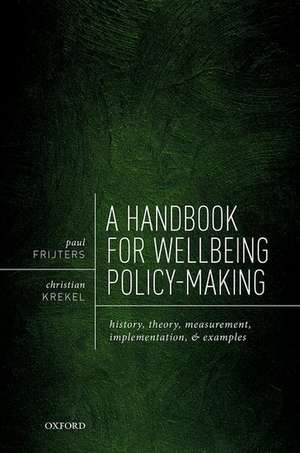A Handbook for Wellbeing Policy-Making: History, Theory, Measurement, Implementation, and Examples
Autor Paul Frijters, Christian Krekelen Limba Engleză Hardback – 27 mai 2021
Preț: 706.56 lei
Preț vechi: 845.04 lei
-16% Nou
Puncte Express: 1060
Preț estimativ în valută:
135.24€ • 146.95$ • 113.68£
135.24€ • 146.95$ • 113.68£
Carte disponibilă
Livrare economică 20-26 martie
Preluare comenzi: 021 569.72.76
Specificații
ISBN-13: 9780192896803
ISBN-10: 0192896806
Pagini: 464
Ilustrații: 37 Figures, 31 Tables
Dimensiuni: 163 x 141 x 30 mm
Greutate: 0.85 kg
Ediția:1
Editura: OUP OXFORD
Colecția OUP Oxford
Locul publicării:Oxford, United Kingdom
ISBN-10: 0192896806
Pagini: 464
Ilustrații: 37 Figures, 31 Tables
Dimensiuni: 163 x 141 x 30 mm
Greutate: 0.85 kg
Ediția:1
Editura: OUP OXFORD
Colecția OUP Oxford
Locul publicării:Oxford, United Kingdom
Recenzii
the book makes a very important contribution as it brings wellbeing research that has grown rapidly over the last three decases to policy by develping a forceful framework for welling cost-effectiveness analysis.
timely ... Handbook for Wellbeing Policy-Making is especially recommended for practitioners at all levels of government
I think the book is timely, in a world where wellbeing budgets and wellbeing policy plays a much bigger role than before...the book starts well with a concise and wellwritten introduction to the history of thought behind the WELLBY concept and its relationship to current policy...as an academic or a practitioner with a strong interest in operationalising the WELLBY to inform public policy or policy analysis and evaluation the book is a worthwhile starting point - it provides examples and formulas or recipes to conduct a wellbeing analysis of policies implemented or proposed.
timely ... Handbook for Wellbeing Policy-Making is especially recommended for practitioners at all levels of government
I think the book is timely, in a world where wellbeing budgets and wellbeing policy plays a much bigger role than before...the book starts well with a concise and wellwritten introduction to the history of thought behind the WELLBY concept and its relationship to current policy...as an academic or a practitioner with a strong interest in operationalising the WELLBY to inform public policy or policy analysis and evaluation the book is a worthwhile starting point - it provides examples and formulas or recipes to conduct a wellbeing analysis of policies implemented or proposed.
Notă biografică
Paul Frijters is Professor of Wellbeing Economics at the London School of Economics. From 2016 to 2019 he was at the Center for Economic Performance and thereafter at the Department of Social Policy. He completed his Masters in Econometrics at the University of Groningen and his PhD in Economics at the University of Amsterdam. He has taught at the University of Melbourne, the Australian National University, the University of Queensland, and the LSE. Professor Frijters specializes in applied microeconometrics, including labour, health, and happiness economics and has published over 150 refereed journal articles. In 2009, he was voted Australia's best young economist under the age of 40 by the Australian Economic Society.Christian Krekel is Assistant Professor in Behavioural Science in the Department of Psychological and Behavioural Science at the London School of Economics. He is also a Research Associate at the Centre for Economic Performance and at the Wellbeing Research Centre at the University of Oxford. Dr Krekel is an applied economist and his research fields include behavioural economics and wellbeing, policy and programme evaluation, and applied panel and spatial analysis. He obtained his PhD in Economics from the Paris School of Economics. He was awarded the Young Economist Award by the European Economic Association.
